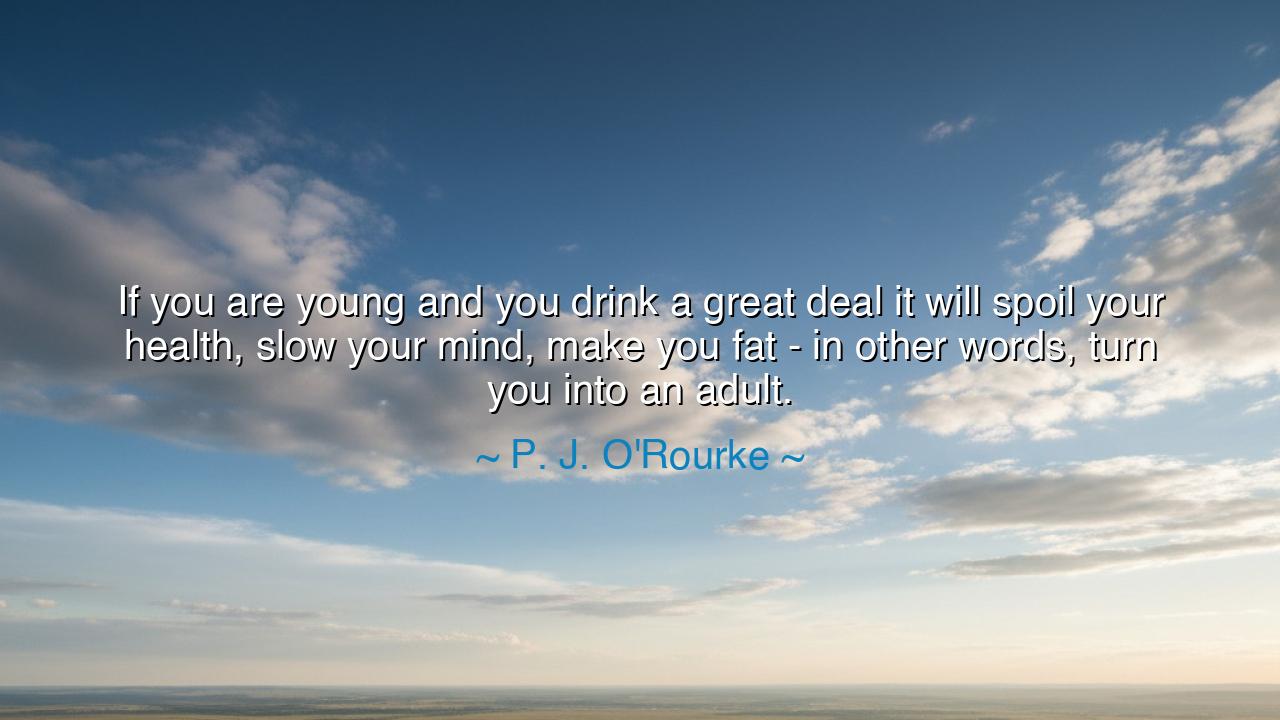
If you are young and you drink a great deal it will spoil your
If you are young and you drink a great deal it will spoil your health, slow your mind, make you fat - in other words, turn you into an adult.






“If you are young and you drink a great deal it will spoil your health, slow your mind, make you fat — in other words, turn you into an adult.” Thus spoke P. J. O’Rourke, with that sharp wit that slices through the illusions of modern life. At first glance, the words seem clothed in jest — a mere satire upon youth and indulgence — but beneath their laughter lies the sting of truth. For O’Rourke, in his cunning humor, was not mocking youth, but warning it: that the decay of spirit often comes disguised as maturity, and that what we call “growing up” may sometimes be nothing more than the slow surrender of vitality to habit, conformity, and excess.
In this paradox, the drink becomes a symbol, not merely of wine or liquor, but of all the indulgences through which men seek to escape life’s discomforts. Youth, in its rawness, drinks of life itself — it hungers for discovery, dares to dream, and risks itself in pursuit of meaning. Yet as the years advance, the same spirit that once burned with fire is dulled by complacency and indulgence. The mind slows, not from age alone, but from spiritual intoxication — from the numbing routine of comfort, consumption, and resignation. Thus, O’Rourke’s jest conceals a lament: that too many grow old not by time, but by the slow death of enthusiasm.
In the ancient world, the wise men saw this truth clearly. Seneca, the Stoic philosopher, warned that “men do not die from age, but from wasting their time.” He too saw how mankind mistakes decadence for development, and ease for wisdom. The soul that once sought virtue begins to seek pleasure, and the body, dulled by excess, drags the mind with it into slumber. To be truly young, therefore, is not a matter of years but of spirit — to keep alive that sacred restlessness that demands purpose, health, and clarity.
Think, then, of the artist Vincent van Gogh. Though he lived only thirty-seven years, he burned with a passion that most never know. He drank deeply of struggle, poverty, and beauty — but never of dullness. His body failed him, yet his mind remained ablaze with wonder and faith in life’s mystery. Compare him to those who live long but without fire — their bellies full, their dreams forgotten, their laughter thin and mechanical. O’Rourke’s irony pierces this contrast: he mocks not the adult in years, but the adult in spirit, who has bartered wonder for weariness.
To “turn into an adult,” in O’Rourke’s meaning, is to lose the lightness of being. It is to let the chains of habit replace the wings of youth, to exchange curiosity for cynicism, and to numb the soul in the name of responsibility. The world may call this prudence; the ancients called it forgetfulness of the soul. For true adulthood, as the sages taught, is not the dimming of vitality but the refining of it — to be both wise and wild, disciplined yet daring, sober yet luminous. The tragedy is not in aging, but in growing indifferent.
Therefore, let the young — and even more, the old — take heed. Do not drink too deeply of comfort. Guard your health, that your body may serve your spirit; guard your mind, that it may remain swift and curious; and guard your joy, for it is the essence of your youth. Seek the wine of knowledge, not the intoxication of excess. Nourish your days with movement, creation, and courage. For though the years will march on, the flame within need not dim.
And thus, dear listener, the lesson is clear: the jest hides a revelation. The world will tell you that adulthood means surrender — to dullness, to heaviness, to the slow corrosion of wonder. But reject that lie. Stay fierce in heart, awake in mind, and alive in spirit. For the true adult, as the ancients knew, is one who has learned to live wisely without ceasing to live vividly. And the true youth is not one who is young in years, but one who, even after a lifetime of storms, still lifts the cup of life and drinks — not to escape, but to rejoice.






AAdministratorAdministrator
Welcome, honored guests. Please leave a comment, we will respond soon